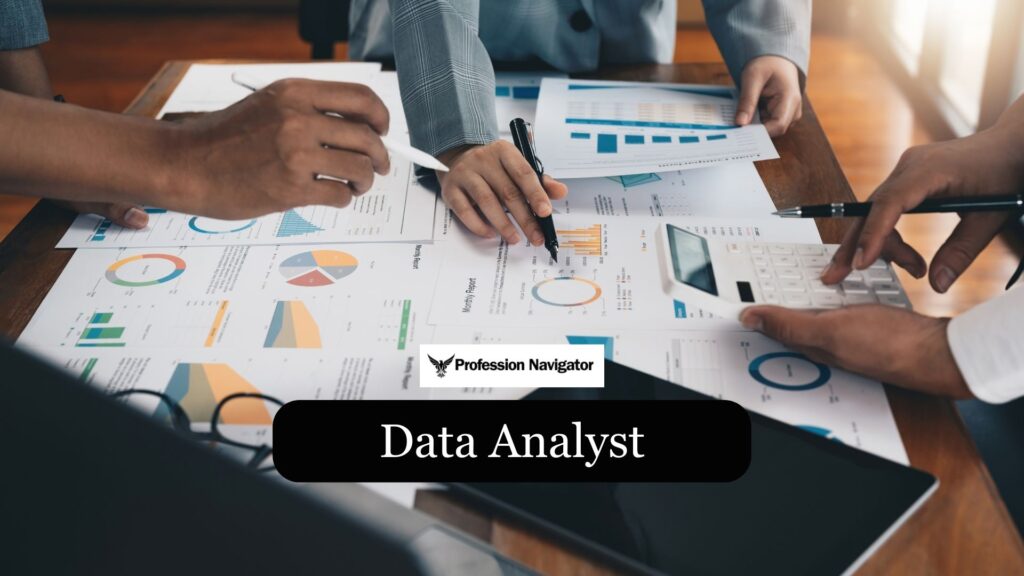In today’s data-driven world, the role of a data analyst has become increasingly vital across industries. From uncovering insights to driving strategic decisions, data analysts play an important role in helping organizations make sense of vast amounts of data. If you’re considering a career as a data analyst, here’s a complete guide to help you get started.
What Does a Data Analyst Do?
Data analysts interpret data, analyze results, and provide insights to help businesses make informed decisions. They collect, organize, and interpret data using statistical techniques and software tools to identify trends and patterns.
Table of Contents
READ ALSO: Top 10 In-Demand Jobs in Canada in 2024
Types of Data Analyst
Business Analyst: Concentrates on analyzing business processes, specifying areas for improvement, and making data-driven recommendations to enhance business performance.
Data Analyst: Deals with analyzing data, cleaning and processing datasets, and providing insights to support organizational decision-making.
Data Scientist: Utilises statistical methods, machine learning algorithms, and programming skills to extract insights and build predictive models from complex datasets.
Quantitative Analyst (Quant): Specialises in financial data analysis, using mathematical and statistical techniques to inform investment decisions, risk management, and financial modeling.
Market Research Analyst: Researches to understand market trends, consumer behavior, and competitive landscapes by analyzing survey data, sales figures, and other relevant information.
Healthcare Analyst: Analyzes healthcare data to identify patterns, trends, and outcomes, helping healthcare providers and policymakers make informed decisions to improve patient care and public health.
Operations Analyst: Focuses on improving operational efficiency by analyzing processes, identifying bottlenecks, and implementing strategies to streamline workflows and reduce costs.
Social Media Analyst: Examines social media data to understand audience behavior, sentiment, and engagement levels, providing insights to inform marketing strategies and brand management.
Research Analyst: Conducts in-depth research on specific topics or industries, analyzing data to generate insights and produce reports for academic, corporate, or governmental purposes.
Statistical Analyst: Specialises in statistical analysis, applying mathematical techniques to interpret data, test hypotheses, and make predictions in various fields such as economics, sociology, and environmental science.
These are just a few examples, and there can be overlaps between roles, especially in interdisciplinary fields like data science. The specific responsibilities and skill requirements may vary depending on the industry and organization.
Steps on how to get a data analyst job
Acquire the Right Education:
Obtain a bachelor’s degree in a field related to data analysis (e.g., statistics, mathematics, computer science).
Develop Technical Skills:
Learn programming languages such as SQL, Python, and R.
Familiarize yourself with data manipulation, statistical analysis, and data visualization techniques.
Gain Practical Experience:
Seek internships, part-time roles, or volunteer opportunities in data analysis.
Apply your skills in real-world settings to gain hands-on experience.
Build a Strong Portfolio:
Showcase data analysis projects, including datasets, worked with, methodologies used, and insights generated.
Create visualizations and reports to demonstrate your abilities.
Network within the Industry:
Attend industry events, conferences, and networking sessions.
Engage with professionals in the field through online communities and social media platforms.
Customize Your CV and Cover Letter:
Tailor your CV and cover letter to highlight relevant skills and experiences.
Use keywords from job descriptions to demonstrate suitability for roles.
Prepare for Interviews:
Research companies and roles thoroughly.
Practice answering common interview questions related to data analysis and problem-solving.
Continuous Learning:
Stay updated with the latest trends and tools in data analysis.
Take online courses, and workshops, and pursue professional development opportunities.
Apply Strategically:
Focus on roles aligned with your skills and career goals.
Tailor applications to each opportunity, highlighting relevant experiences.
Follow Up:
Send thank-you emails or notes after interviews.
Express continued interest in positions to hiring managers.
By following these steps, you can enhance your prospects of securing a data analyst job.
Importance of Data Analysts in Today’s World
Data analysts help businesses gain a competitive edge by turning raw data into actionable insights. They assist in optimizing processes, improving efficiency, and identifying growth opportunities. In an era where data is abundant but underutilized, skilled data analysts are in high demand across industries.
Salary Estimation for Data Analysts
The salary of a data analyst can vary based on factors such as experience, education, location, and industry. On average, entry-level data analysts can expect to earn a competitive salary, with the potential for significant increases as they gain experience and expertise.
The salary of data analysts can vary based on factors such as their experience, the industry they work in, and their geographical location. In the United Kingdom (UK), data analysts typically work full-time and earn an average annual salary of £32,383. However, in London, where living costs are higher, data analysts tend to earn more, with an average annual salary of £40,490, as reported by Indeed Salaries.
Education Required to Become a Data Analyst
While a bachelor’s degree in fields such as statistics, mathematics, economics, or computer science is often required, some employers may prefer candidates with a master’s degree or higher. Additionally, coursework in data analysis, database management, and programming languages like SQL and Python can provide a strong foundation for aspiring data analysts.
Training Opportunities for Aspiring Data Analysts
Many online platforms offer courses and training programs specifically designed for aspiring data analysts. These programs cover a range of topics, including data visualization, data manipulation, and machine learning, providing practical skills that are highly valued in the field.
Certifications for Data Analysts
Obtaining relevant certifications can enhance your credibility and marketability as a data analyst. Certifications such as the Certified Analytics Professional (CAP) and the Microsoft Certified: Data Analyst Associate demonstrate proficiency in data analysis techniques and tools.
Essential Skills for Data Analysts
Successful data analysts possess a combination of technical and soft skills. In addition to proficiency in programming languages and data analysis tools, effective communication, problem-solving, and critical thinking skills are essential for interpreting data and presenting findings effectively.
Technical Skills Needed for Data Analysts
Data analysts must be proficient in programming languages such as SQL, Python, and R, as well as data visualization tools like Tableau or Power BI. Strong mathematical and statistical skills are also crucial for analyzing data and identifying trends.
Analytical Skills Required for Data Analysis
Data analysts must possess strong analytical skills to identify patterns, trends, and correlations within datasets. They must be able to translate complex data into actionable insights that drive decision-making and business strategies.
Communication Skills for Data Analysts
Effective communication skills are essential for data analysts to convey their findings to non-technical stakeholders. Data analysts must be able to present complex information concisely and understandably, both verbally and through visualizations.
Problem-Solving Skills
Data analysts are tasked with solving complex problems using data-driven approaches. They must be able to think critically, identify issues, and develop innovative solutions that address business challenges and opportunities.
Tools Utilized by Data Analysts
Data analysts rely on a variety of tools and technologies to perform their jobs effectively. From data visualization platforms like Tableau to programming languages like Python and statistical software such as SPSS, proficiency in these tools is essential for success in the field.
Conclusion
Becoming a data analyst offers a rewarding career path with ample opportunities for growth and advancement. Aspiring data analysts can position themselves for success in this dynamic and in-demand field by acquiring the necessary education, training, certifications, and skills.
FAQs
What qualifications do I need to become a data analyst?
While a bachelor’s degree in a related field is often required, additional coursework or certifications can enhance your prospects.
What programming languages should I learn for data analysis?
Python, SQL, and R are commonly used in data analysis and are worth learning to excel in the field.
Are there any specific industries that require data analysts?
Data analysts are in demand across various industries, including finance, healthcare, e-commerce, and technology.
Is experience necessary to become a data analyst?
While experience can be beneficial, entry-level positions and internships offer opportunities for gaining practical experience in the field.
How can I stay updated with the latest trends in data analysis?
Engaging in continuous learning through online courses, workshops, and industry publications can help you stay abreast of developments in data analysis techniques and technologies.




Pingback: Understanding The National Living Wage UK: What You Need To Know In 2024 - UK Immigration Navigator